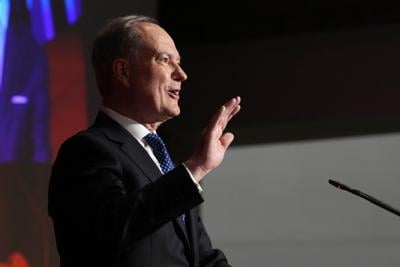President Donald Trump’s trade war is a “wake-up call” to reduce Canada’s reliance on the U.S., warns Ontario Finance Minister Peter Bethlenfalvy.
In a major speech at an Empire Club of Canada luncheon that sets the table for Thursday’s provincial budget, Bethlenfalvy said it’s time for “nation-building” infrastructure projects to create jobs, boost unity and spark economic growth.
“Right now, Ontario is facing a challenge like we have not faced before. Our closest ally — the United States — has imposed tariffs on us that are challenging a relationship that was once considered unshakable,” the treasurer said Monday.
“The situation we are in today is a wake-up call — the status quo is no longer an option,” he told more than 800 people at the Fairmont Royal York Hotel event.
“That is what the budget I will be presenting later this week is going to be about: boosting our economic prosperity, thinking big and bold, and championing nation-building projects like the Ring of Fire and world leading nuclear energy … and, critically, pipelines.”
To that end, Premier Doug Ford’s Progressive Conservatives will be working closely with other provincial leaders and Prime Minister Mark Carney’s Liberals to eliminate most internal trade barriers.
“Whether they are east to west or north to south, Team Canada needs to come together and work to champion these new pipelines that will help get more of our oil and natural gas to market and help bind all 13 provinces and territories together more closely while reducing our reliance on the United States,” he said.
Bethlenfalvy — who pointedly gave a shoutout to Tim Hodgson, the newly elected Markham-Thornhill Liberal MP — urged Carney to “put an end to barriers like Ottawa’s Bill C-69 — a law that blocks building in Canada — and … instead work with us to speed up permitting” for mines and pipelines.
While Ontario is still in the red — and is expected to be running budget deficits for the foreseeable future — he insisted the province’s finances are in good shape.
“Our efforts to maintain that fiscal prudence have resulted in Ontario seeing some major wins, including two credit rating upgrades last year alone, the lowest interest costs as a percentage of revenue we’ve had since the 1980s, and among the lowest borrowing costs of any Canadian province,” Bethlenfalvy noted.
That’s a reference to the province’s credit rating being upgraded to “AA-” from “A+(P)” by S&P Global in December, the first such improvement from that influential agency since 2001, and Morningstar DBRS boosting Ontario to “AA” from “AA (low) (P)” 11 months ago.
“Our finances are in the best health they’ve been in decades — and we’re going to use that to make the necessary investments to protect Ontario and build the economy of tomorrow,” he said.
The treasurer reiterated his “Plan to Protect Ontario” spending plan will help domestic manufacturers with a new tax credit and supports that could be worth about $1.3 billion over three years.
“This would be a major boost of confidence to the sector as it looks for certainty at a time when U.S. tariffs have created uncertainty and it would be a significant tool for businesses as they look for more ways to also help keep their workers on the job.”
To build “a stronger, more resilient, self-sufficient and competitive province,” Bethlenfalvy said increased investments on skills training are required.
“So far, one million workers have been trained and re-skilled for in-demand jobs through our Skills Development Fund,” he said, adding he would be topping up the fund’s training stream by another $1 billion so it will total $2.5 billion.
“This won’t just help our workers — it will help their families as well as they look for ways to weather this storm.”
Thursday’s budget will be the first fiscal blueprint since Ford’s three-term Tories were re-elected Feb. 27 on a promise to tackle Trump’s 25 per cent tariffs on many Canadian products.
NDP MPP Catherine Fife (Waterloo), who attended Bethlenfalvy’s speech, said it was significant the treasurer did not cite Ford’s proposed Hwy. 401 tunnel from Mississauga to Scarborough as nation-building infrastructure.
“It was notable the finance minister did not mention that project. We cannot afford ... to go down this road,” said Fife, referring to the potential cost of $120 billion to dig beneath the busiest stretch of highway in North America.
The government is conducting a feasibility study on a scheme that’s designed to tackle gridlock.
Error! Sorry, there was an error processing your request.
There was a problem with the recaptcha. Please try again.
You may unsubscribe at any time. By signing up, you agree to our and . This site is protected by reCAPTCHA and the Google and apply.
Want more of the latest from us? Sign up for more at our newsletter page.



































To join the conversation set a first and last name in your user profile.
Sign in or register for free to join the Conversation